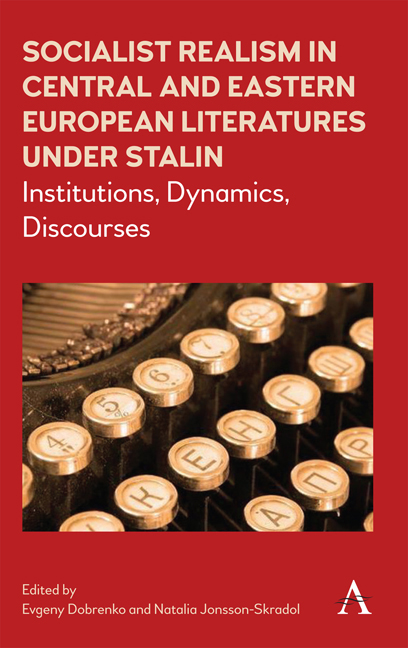 Socialist Realism in Central and Eastern European Literatures under Stalin
Socialist Realism in Central and Eastern European Literatures under Stalin Book contents
- Frontmatter
- Contents
- Acknowledgements
- Introduction
- Part 1 Institutions
- Part 2 Dynamics
- 8 Socialist Writers and Intellectuals in a Divided Nation: The Early GDR Experience
- 9 Stalinism's Imperial Figure: Hero or Clerk of the Pax Sovietica?
- 10 From Avant-Garde to Socialist Realism: Continuities and Discontinuities in Hungarian and Romanian Literature
- 11 The Short Life of Socialist Realism in Croatian Literature, 1945–55
- 12 Literature in Socialist Yugoslavia: Constructing Collective Memory, Institutionalizing the Cultural Field
- 13 ‘Yesterday and Tomorrow’: The Forms of the Slovak Literature of Socialist Realism, 1945–56
- 14 Socialist or Realist: The Poetics of Politics in Sovietized Hungary
- Part 3 Discourses
- Conclusion
- List of Contributors
- Index
10 - From Avant-Garde to Socialist Realism: Continuities and Discontinuities in Hungarian and Romanian Literature
from Part 2 - Dynamics
Published online by Cambridge University Press: 10 May 2018
- Frontmatter
- Contents
- Acknowledgements
- Introduction
- Part 1 Institutions
- Part 2 Dynamics
- 8 Socialist Writers and Intellectuals in a Divided Nation: The Early GDR Experience
- 9 Stalinism's Imperial Figure: Hero or Clerk of the Pax Sovietica?
- 10 From Avant-Garde to Socialist Realism: Continuities and Discontinuities in Hungarian and Romanian Literature
- 11 The Short Life of Socialist Realism in Croatian Literature, 1945–55
- 12 Literature in Socialist Yugoslavia: Constructing Collective Memory, Institutionalizing the Cultural Field
- 13 ‘Yesterday and Tomorrow’: The Forms of the Slovak Literature of Socialist Realism, 1945–56
- 14 Socialist or Realist: The Poetics of Politics in Sovietized Hungary
- Part 3 Discourses
- Conclusion
- List of Contributors
- Index
Summary
The Status of the Avant- Garde and Socialist Realism in the Romanian and Hungarian Contexts
Histories of Hungarian literature written in the past two decades tend to describe ‘the episode of socialist realism’ as an imposed deviation or even a gap within the continuity of the Hungarian literary tradition. This idea of ‘interrupted continuity’ seems to be present also in the scholarship on twentieth- century Romanian literature. In his overview of the forerunners and beginnings of postmodernist literature in Romania, Mircea CĂrtĂrescu, who is perhaps the best- known living Romanian novelist, speaks about the ‘frozen’ nature of Romanian culture and society during the 1950s and the 1960s. Researchers of literary history in these countries seem to agree that the possibility to fully reconnect with the tradition (after the partial return in the 1970s to the literary poetics of the interwar period) came only after 1989, with the re- establishment of democratic literary institutions.
These metaphorical references in the post- communist period to ‘interruption’ and ‘freezing’ seem to imply that after a certain historical delay, or after a period during which the culture of these countries followed a wrong path, things should have gone back to the course that had been abandoned in 1948, the year when changes in cultural policies began to produce visible effects in Eastern European countries. However, this approach ignores the fact that during the decades of the ‘deviation’ the structure of Hungarian, Romanian and other neighbouring societies changed considerably. Even if the poetics of some literary works seems to indicate that their authors have liberated themselves from the constraints of socialist realism, either during the ‘neomodernism’ stage of the late 1960s and the 1970s or during the era of postmodernism in the 1980s and the 1990s, the general cultural context was already radically different. There are, of course, just as Mircea CĂrtĂrescu points out, certain similarities between, for example, the texts produced in the 1940s and those written in the 1970s, just as it is true that some of the post- communist cultural, social and political models, particularly those related to nation building or to the political institutions of democracy, seem to correspond to the social logic that defined the society in Romania or Hungary before the wars.
- Type
- Chapter
- Information
- Socialist Realism in Central and Eastern European Literatures under StalinInstitutions, Dynamics, Discourses, pp. 147 - 164Publisher: Anthem PressPrint publication year: 2018
